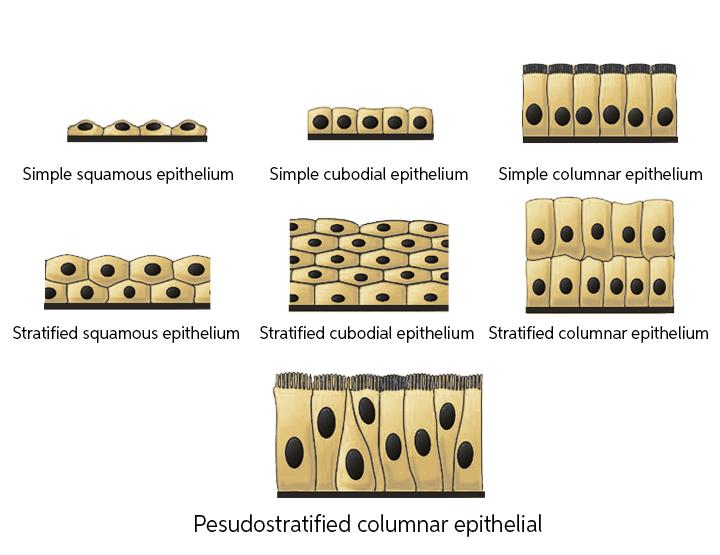
Characteristic of epithelial tissues is
(a) Never produce glands
(b) Cells can undergo rapid divisions
(c) Abundant vascularisation
(d) Large intercellular spaces
Answer
591.6k+ views
Hint: The epithelial tissue consists of cells with tight cell-to-cell attachments spread out in sheets. In epithelia, the cell turnover that is the continuous shedding of dead cells with the replacement of younger cells is very rapid.
Complete answer:
The main characteristic of epithelial tissues is cells can be subjected to rapid division. Epithelial tissue is abundant all over the body. They form the covering of all surfaces of the body, line cavities of the body, and hollow organs and are the main tissue in glands. Glands subdivided as exocrine and endocrine are composed of epithelial tissue. Cells are densely packed with minimal intercellular substance. The cells have one free surface that is not in contact with other cells because the tissues form coverings and linings. The avascular sense of epithelial tissue is that they lack their blood vessels. Exchange of nutrients and waste occurs by diffusion through the surrounding connective tissues.

Figure: Different types of Epithelial tissue
So the correct answer is ‘Cells can undergo rapid divisions’.
Additional Information:
Epithelial tissues conduct several functions including defense, secretion, absorption, diffusion, filtration, excretion, and sensory reception. Epithelial tissue is simply classified into two categories such as simple epithelium and stratified epithelium. When the tissue is made up of a single layer of cells it is called simple epithelium whereas tissue with two or more layers is called the stratified epithelium.
Note: - Epithelial tissues provide first-line protection for the body against physical, chemical, and biological wear and tear.
- The epithelium cells serve as the body's gatekeepers regulating permeability and enabling materials to be selectively moved over a physical obstacle.
Complete answer:
The main characteristic of epithelial tissues is cells can be subjected to rapid division. Epithelial tissue is abundant all over the body. They form the covering of all surfaces of the body, line cavities of the body, and hollow organs and are the main tissue in glands. Glands subdivided as exocrine and endocrine are composed of epithelial tissue. Cells are densely packed with minimal intercellular substance. The cells have one free surface that is not in contact with other cells because the tissues form coverings and linings. The avascular sense of epithelial tissue is that they lack their blood vessels. Exchange of nutrients and waste occurs by diffusion through the surrounding connective tissues.

Figure: Different types of Epithelial tissue
So the correct answer is ‘Cells can undergo rapid divisions’.
Additional Information:
Epithelial tissues conduct several functions including defense, secretion, absorption, diffusion, filtration, excretion, and sensory reception. Epithelial tissue is simply classified into two categories such as simple epithelium and stratified epithelium. When the tissue is made up of a single layer of cells it is called simple epithelium whereas tissue with two or more layers is called the stratified epithelium.
Note: - Epithelial tissues provide first-line protection for the body against physical, chemical, and biological wear and tear.
- The epithelium cells serve as the body's gatekeepers regulating permeability and enabling materials to be selectively moved over a physical obstacle.
Recently Updated Pages
Master Class 11 Computer Science: Engaging Questions & Answers for Success

Master Class 11 Business Studies: Engaging Questions & Answers for Success

Master Class 11 Economics: Engaging Questions & Answers for Success

Master Class 11 English: Engaging Questions & Answers for Success

Master Class 11 Maths: Engaging Questions & Answers for Success

Master Class 11 Biology: Engaging Questions & Answers for Success

Trending doubts
One Metric ton is equal to kg A 10000 B 1000 C 100 class 11 physics CBSE

There are 720 permutations of the digits 1 2 3 4 5 class 11 maths CBSE

Discuss the various forms of bacteria class 11 biology CBSE

Draw a diagram of a plant cell and label at least eight class 11 biology CBSE

State the laws of reflection of light

Explain zero factorial class 11 maths CBSE




